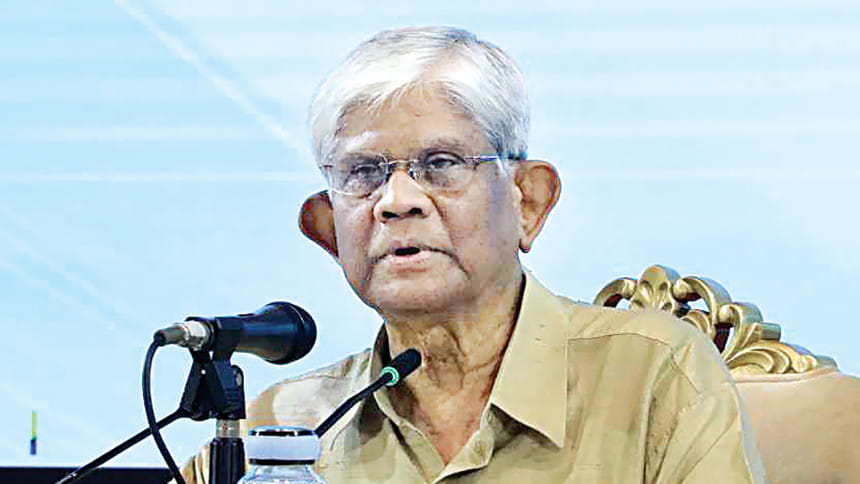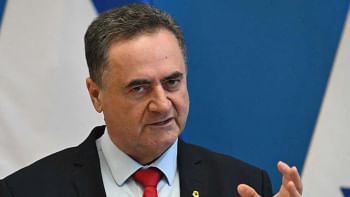Budget ‘realistic, pragmatic’

Finance Adviser Salehuddin Ahmed yesterday described the budget for the new fiscal year as "realistic, implementable, and pragmatic", saying it aims to stabilise the economy.
"We didn't want to just make lofty promises or use flowery rhetoric," Salehuddin said at a post-budget media briefing in Dhaka. "Most of the commitments we made are grounded in what's practically possible."
The Tk 790,000 crore budget for fiscal 2025-26 is the first in years to be smaller than the previous one in original size. "Normally, budgets keep expanding every year, but this time we've trimmed it," he said. "The aim is to deliver something we can actually implement, not just announce."
Salehuddin said the interim administration inherited a fragile economy teetering on the edge. "Some said the country was in the ICU. Others said we were at the edge of a cliff, especially in financial governance," he said. "We had to restore order, bring back normalcy, and revive economic activity. That's been our first priority."
Despite constraints, the government has opted not to pursue a highly expansionary fiscal path. "We've heard talk of high growth for years. But who has actually benefited?" Salehuddin said. "We want to improve the quality of life, make living easier for ordinary people, raise purchasing power, and ensure that business and trade can thrive. That's the focus of this budget."
BLACK MONEY DEBATE
Salehuddin also addressed the politically sensitive topic of black money, saying the government was weighing both the ethical and economic implications of legalising undeclared income.
"There are two sides to this," he said. "One is the moral question -- should we even allow it? The other is practical -- will it help us collect more tax revenue?"
While the budget does not offer blanket amnesty, it includes limited provisions for legalising undisclosed funds in real estate. "This isn't a free pass to whitewash everything," Salehuddin clarified. "For example, if you build on your own land, you will have to pay a specific amount. That's been formalised."
The adviser rejected the notion that such measures signal a policy failure. "We're not saying it's a good thing to whiten black money. But sometimes you have to look at it sector by sector," he said. "There may definitely be something to consider regarding the whitening of black money -- we will evaluate what can be done."
Amid criticism of the black money provision, Abdur Rahman Khan, chairman of the National Board of Revenue (NBR), said the government could reconsider it if necessary.
The finance adviser pointed to several policy initiatives targeting underserved groups. "Bangladesh Bank has set up a large fund for women entrepreneurs. We are allocating money for startups and for the youth. These are steps toward inclusive development."
INSTITUTIONAL REPAIR
Salehuddin placed particular emphasis on rebuilding damaged institutions, especially in the financial sector. "Many institutions were either broken or deliberately weakened. Even capable people cannot function if the structure around them is hollow."
The adviser said Bangladesh Bank, under its current leadership, was taking action to trace and recover laundered assets. "This is not an easy task. People who launder money are extremely clever. They layer the transactions -- it goes from Sylhet to Keraniganj to Brahmanbaria. You have to track all that," he said.
"Twelve high-profile cases are already under investigation. It will take time. Look at Nigeria, it took 18 years. But at least we've started."
Salehuddin acknowledged that the current administration has not sought to reinvent the wheel but has retained elements of the macroeconomic framework left by the previous government.
He said it's not realistic to expect a dramatic break from the past with a "flashy, revolutionary budget that suddenly delivers massive new revenue".
"Some say we're just following in old footsteps -- there's some truth to that," he said. "But that doesn't mean there's no innovation. There are some bold steps in tax and expenditure. There are certain frameworks and methodologies in place, and those need to be carried forward successfully."
He added that the budget remains open for public feedback and that suggestions will be considered before final approval later this month. "We are asking for constructive collaboration, not just one-sided criticism."
BUDGET GEARED TOWARD STABILITY
Planning Adviser Wahiduddin Mahmud said the proposed budget aims to restore economic stability through pragmatism and fiscal discipline, mainly by curbing excessive public expenditure. "This budget follows austerity measures," he said at the media briefing. "We've already paid off our foreign loans. We did it without taking new ones."
He criticised the previous government for approving many projects based solely on political considerations without securing adequate financing. "The interim government is now implementing projects approved by the previous administration, because budgeting is a continuous process," he said.
Of the 1,113 projects initiated by the previous government, the interim administration has approved only 20 to 30, and those were pre-listed by the former government, he said.
While the interim government has not taken on any new mega projects, it has prioritised the continuation of several important ones that are already underway. "We cannot abandon projects halfway through," he said, citing the Matarbari power plant, Bay Terminal, and Mongla Seaport as key priorities.
Energy Adviser Muhammad Fouzul Kabir Khan described the 2025-26 budget as "exceptional" in its focus on reducing excessive costs and curbing irregularities.
He expressed hope that inflation would ease soon, citing recent cuts in petroleum and LPG prices. "We're also increasing LNG imports to meet industrial demand."
Commerce Adviser Sk Bashir Uddin addressed previous warnings of possible food shortages. "The former prime minister warned there might be a famine, but that didn't happen because we took action to strengthen the supply of essential commodities."
Agriculture Adviser Lt Gen Md Jahangir Alam Chowdhury (retd) said that this year's boro season yielded 1.5 million tonnes of additional paddy. To support farmers, the government plans to build 100 small cold storage facilities to help them preserve their produce and sell during periods of market stress.
Finance Secretary Khairuzzaman Mozumder said the budget has been designed to avoid excessive reliance on bank borrowing.
The government also expanded coverage under social safety net programmes, he said, adding that the measures are expected to help ease inflationary pressure.
NBR Chairman Abdur Rahman Khan said tax rates on nearly all essential goods have been proposed for reduction. "This budget also aims to protect local industries."

 For all latest news, follow The Daily Star's Google News channel.
For all latest news, follow The Daily Star's Google News channel. 



Comments